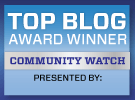Be aware of cars that are speeding, drifting across lanes and erratically braking. Watch for high beams. It's often a sign of a drunk driver. While you might be tempted to flash a high beaming car, be careful not to overdo it. The driver could be distracted by the flashing lights and swerve into your lane. Drunk drivers often travel with their headlights off or their parking lights on. Some turn on an interior light to adjust the heat or radio, then forget to turn the light off. If you spot these signs in an oncoming car, move to the right-hand lane as quickly (and safely) as possible. Never pass a driver you suspect is drunk. If you stay behind, you can see and react to problems. To create some distance between yourself and a drunk driver, safely pull into a parking lot, wait a few minutes, then proceed. Lose a tailgater by making a right-hand turn when you can do so safely. It may be a drunk driver who's using your tail lights as a focal point. Most drivers under the influence won't be able to respond fast enough to follow you. Keep your distance at intersections. Drunk drivers tend to cut the corners short or wide. While it's always a good idea to stay one or two car lengths back from an intersection, on New Year's Eve you should make it three car lengths. Don't pull off to the shoulder unless you have no choice. A drunk driver can easily mistake your tail lights for moving traffic and may drift onto the shoulder, as if it was a driving lane. Remain on alert after sunrise. Many people will try to `sleep off' the alcohol, then start driving at daybreak. But if they've had too much to drink, they still can be driving under the influence.
